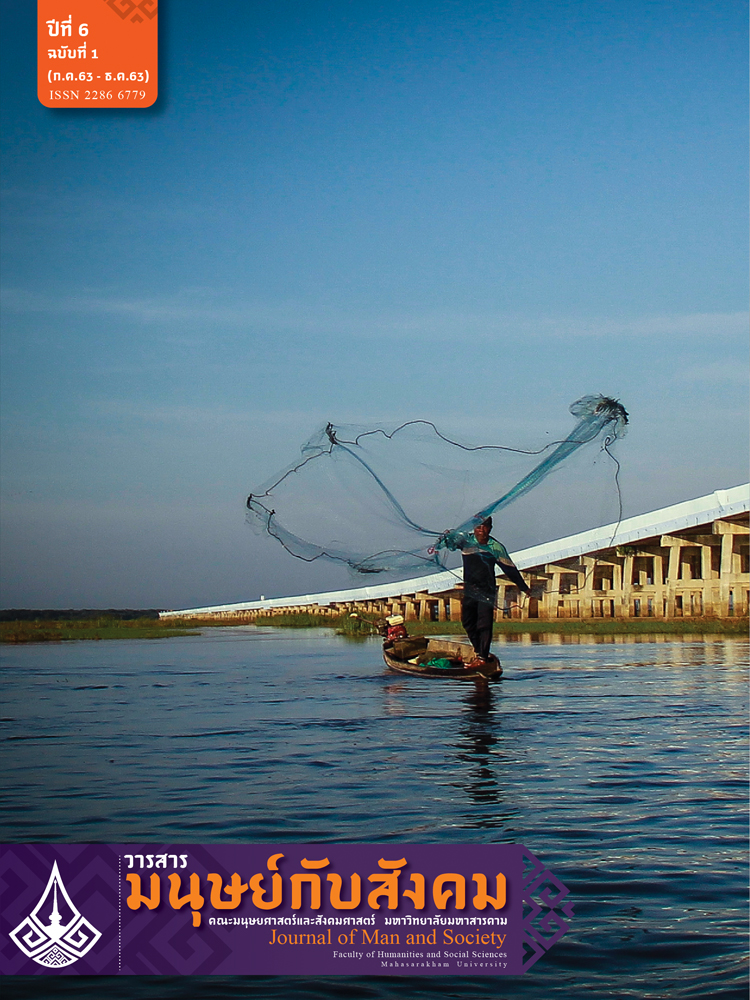อำนาจของผู้หญิง: การท้าทายความสัมพันธ์เชิงอำนาจกับแนวคิดปิตาธิปไตยในนวนิยายสมัยใหม่
Main Article Content
บทคัดย่อ
บทความนี้มีวัตถุประสงค์เพื่อศึกษาการตอบโต้และต่อรองอำนาจปิตาธิปไตยในนวนิยายเรื่อง The Single Mom คุณแม่เลี้ยงเดี่ยวหัวใจฟรุ้งฟริ้ง ของต้นรัก ผลการศึกษาพบว่าผู้หญิงในสังคมสมัยใหม่มีอำนาจท้าทายผู้ชาย 2 ลักษณะคือ 1. การใช้อำนาจตอบโต้ด้วยคำพูดและการกระทำ การใช้คำพูดในลักษณะการใช้คำหยาบ การประชดประชัน และการข่มขู่ การตอบโต้ด้วยการกระทำในลักษณะการขัดขืนการล่วงละเมิดทางเพศ การใช้ความรุนแรง และการใช้กฎหมาย 2. การใช้อำนาจต่อรอง ด้วยการพึ่งพาสิ่งศักดิ์สิทธิ์ การอาศัยคนกลาง และการใช้อำนาจทางเศรษฐกิจ จากการศึกษาแสดงให้เห็นการละเมิดกรอบสังคมของตัวละครหญิงทั้งการไม่สามารถดำรงสภาพครอบครัวสมบูรณ์ไว้ได้ และการตอบโต้ผู้ชายเพื่อก้าวข้ามแนวคิดปิตาธิปไตย ทำให้เห็นความสัมพันธ์เชิงอำนาจที่ผู้หญิงใช้ท้าทายแนวคิดชายเป็นใหญ่ อำนาจแปรเปลี่ยนมาอยู่ในมือของผู้หญิงโดยไม่ทำให้สังคมประณามแต่กลับได้รับการยกย่องเชิดชูที่ก้าวข้ามกรอบจารีตของสังคมได้ อีกทั้งยังรู้จักใช้ประโยชน์จากความด้อยกว่าด้านสรีระโดยการใช้ความเชื่อเรื่องสิ่งศักดิ์สิทธิ์สร้างพื้นที่ให้ตนเองมีอำนาจและการใช้คนกลางที่มีสถานภาพเท่าเทียมกันเป็นตัวแทนในการต่อรองกับอำนาจปิตาธิปไตย ในตอนท้ายผู้หญิงดำรงอำนาจของตนเองไว้ได้โดยปฏิเสธแนวคิดปิตาธิปไตยได้อย่างสง่างาม
Article Details
เนื้อหาและข้อมูลที่ตีพิมพ์ลงในวารสารมนุษย์กับสังคม ถือเป็นข้อคิดเห็นและความรับผิดชอบโดยตรงของผู้เขียนซึ่งกองบรรณาธิการวารสารไม่จำเป็นต้องเห็นด้วยหรือร่วมรับผิดชอบใดๆ
บทความ ข้อมูล เนื้อหา รูปภาพ ฯลฯ ที่ได้รับการตีพิมพ์ในวารสารมนุษย์กับสังคม ถือเป็นลิขสิทธิ์ของวารสาร หากบุคคลหรือหน่วยงานใดต้องการนำทั้งหมดหรือส่วนหนึ่งส่วนใดไปเผยแพร่ต่อหรือเพื่่อกระทำการใดๆ จะต้องได้รับอนุญาตเป็นลายลักษณ์อักษรจากวารสารมนุษย์กับสังคมก่อน
เอกสารอ้างอิง
ต้นรัก. (2560). คุณแม่เลี้ยงเดี่ยวหัวใจฟรุ้งฟริ้ง. กรุงเทพฯ: พิมพ์คำ.
ทัดจันทร์ เกตุสิงห์สร้อย. (2554). การวิเคราะห์สถานภาพและบทบาทของแม่ในนวนิยาย “ลับ แล,แก่งคอย”. การค้นคว้าอิสระปริญญาอักษรศาสตรมหาบัณฑิต สาขาวิชาภาษาไทยเพื่อการพัฒนาอาชีพ มหาวิทยาลัยศิลปากร.
ประสพสุข บุญเดช. (2559). หลักกฎหมายครอบครัว. พิมพ์ครั้งที่ 17. กรุงเทพฯ: วัญญูชน.
ปรานี วงษ์เทศ. (2559). เพศและวัฒนธรรม . พิมพ์ครั้งที่4. กรุงเทพฯ: นาตาแฮก
ปิยลักษณ์ โพธิวรรณ์. (2558). ผู้หญิง : บทบาทและความเป็นเพศท่ามกลางกระแสการเปลี่ยนแปลงในสังคมไทย. มหาสารคาม: โรงพิมพ์มหาวิทยาลัยราชภัฏมหาสารคาม.
พลากร เจียมธีระนาถ. (2554). วาทกรรมชายเป็นใหญ่ในภาพยนตร์ไทยที่ให้ความสำคัญแก่สตรี. วิทยานิพนธ์นิเทศศาสตรมหาบัณฑิต สาขาการภาพยนตร์ จุฬาลงกรณ์มหาวิทยาลัย.
ภูเบศร์ สมุทรจักร และคณะ. (2560). ความอยู่ดีมีสุขของครอบครัวไทย. นครปฐม: สถาบันวิจัยประชากรและสังคม มหาวิทยาลัยมหิดล.
ราชบัณฑิตยสภา. (2556). พจนานุกรมฉบับราชบัณฑิตยสถาน พ.ศ.2554. พิมพ์ครั้งที่2. กรุงเทพฯ: นามมีบุ๊คส์พับลิเคชั่น.
วิระดา สมสวัสดิ์. (2540). กฎหมายครอบครัว. กรุงเทพฯ: สายส่งศึกษิตบริษัทเคล็ดไทย.
สรยา รอดเพชร ทัศนีย์ ทานตวาณิช และนัทธนัย ประสานนาม. (2561). “ผู้หญิงกับปิตาธิปไตยในนวนิยายของอุทิศ เหมะมูล” วารสารวิชาการคณะมนุษยศาสตร์และสังคมศาสตร์, 14 (1), 53-79.
สุธรรม ธรรมรงค์วิทย์. (2546). “ความสัมพันธ์แบบหญิงรักหญิงในฐานะการต่อสู้ทางการเมือง”. ในสินิทธ์ สิทธิรักษ์ (บรรณาธิการ). ผู้หญิงกับความรู้1 (หน้า 241-262). กรุงเทพฯ: โครงการสตรีและเยาวชนศึกษา มหาวิทยาลัยธรรมศาสตร์.
สุพัชริณทร์ นาคคงคำ. (2556). ภาพแทนสตรีไทยในนวนิยายอีโรติกของนักเขียนชายไทย. วิทยานิพนธ์ศิลปศาสตรมหาบัณฑิต สาขาวิชาภาษาไทย มหาวิทยาลัยเชียงใหม่.
เสาวคนธ์ วงศ์ศุภชัยนิมิต. (2559). การศึกษาสถานภาพและบทบาทผู้หญิงในนวนิยายของณารา. วิทยานิพนธ์ศิลปศาสตรมหาบัณฑิต สาขาวิชาภาษาไทย มหาวิทยาลัยบูรพา.
อารียา หุตินทะ. (2559). “เมื่อสตรีตามหาประชาธิปไตยในสังคมปิตาธิปไตย”. ในสินีนาถ เศรษฐ-พิศาล (บรรณาธิการเล่ม). หลากมิติประชาธิปไตย : รวมบทความและปาฐกถาทางวรรณกรรม (หน้า 263-310). กรุงเทพฯ: คมบาง.


